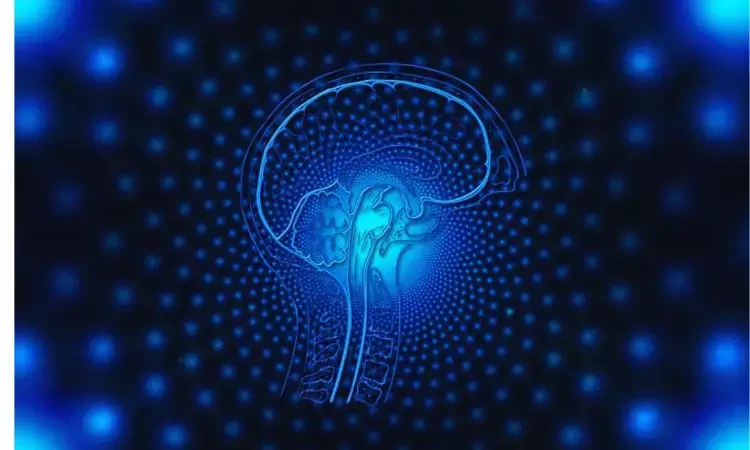- Home
- Medical news & Guidelines
- Anesthesiology
- Cardiology and CTVS
- Critical Care
- Dentistry
- Dermatology
- Diabetes and Endocrinology
- ENT
- Gastroenterology
- Medicine
- Nephrology
- Neurology
- Obstretics-Gynaecology
- Oncology
- Ophthalmology
- Orthopaedics
- Pediatrics-Neonatology
- Psychiatry
- Pulmonology
- Radiology
- Surgery
- Urology
- Laboratory Medicine
- Diet
- Nursing
- Paramedical
- Physiotherapy
- Health news
- Fact Check
- Bone Health Fact Check
- Brain Health Fact Check
- Cancer Related Fact Check
- Child Care Fact Check
- Dental and oral health fact check
- Diabetes and metabolic health fact check
- Diet and Nutrition Fact Check
- Eye and ENT Care Fact Check
- Fitness fact check
- Gut health fact check
- Heart health fact check
- Kidney health fact check
- Medical education fact check
- Men's health fact check
- Respiratory fact check
- Skin and hair care fact check
- Vaccine and Immunization fact check
- Women's health fact check
- AYUSH
- State News
- Andaman and Nicobar Islands
- Andhra Pradesh
- Arunachal Pradesh
- Assam
- Bihar
- Chandigarh
- Chattisgarh
- Dadra and Nagar Haveli
- Daman and Diu
- Delhi
- Goa
- Gujarat
- Haryana
- Himachal Pradesh
- Jammu & Kashmir
- Jharkhand
- Karnataka
- Kerala
- Ladakh
- Lakshadweep
- Madhya Pradesh
- Maharashtra
- Manipur
- Meghalaya
- Mizoram
- Nagaland
- Odisha
- Puducherry
- Punjab
- Rajasthan
- Sikkim
- Tamil Nadu
- Telangana
- Tripura
- Uttar Pradesh
- Uttrakhand
- West Bengal
- Medical Education
- Industry
Hypothyroidism linked to Increased Risk of Dementia, finds study

Hypothyroidism occurs when the thyroid gland doesn't make enough thyroid hormones. The symptoms of hypothyroidism include slow metabolism menifested by feeling tired, weight gain and sensitivity to cold.
Researchers have revealed in a new study that Older people with hypothyroidism may be at increased risk of developing dementia.Further risk of developing dementia was even higher for people whose thyroid condition required thyroid hormone replacement medication.
The study was published in online issue of Neurology.
"In some cases, thyroid disorders have been associated with dementia symptoms that can be reversible with treatment," said study author Chien-Hsiang Weng, MD, MPH, of Brown University in Providence, Rhode Island. "While more studies are needed to confirm these findings, people should be aware of thyroid problems as a possible risk factor for dementia and therapies that could prevent or slow irreversible cognitive decline."
For the study, researchers looked at the health records of 7,843 people newly diagnosed with dementia in Taiwan and compared them to the same number of people who did not have dementia. Their average age was 75. Researchers looked to see who had a history of either hypothyroidism or hyperthyroidism.
Hyperthyroidism, which is also called overactive thyroid, is when the thyroid produces too much hormone. This can increase metabolism. Symptoms include unintended weight loss, rapid or irregular heartbeat and nervousness or anxiety.
A total of 102 people had hypothyroidism and 133 had hyperthyroidism. The researchers found no link between hyperthyroidism and dementia.
Of the people with dementia, 68 people, or 0.9%, had hypothyroidism, compared to 34 of the people without dementia, or 0.4%. When researchers adjusted for other factors that could affect the risk of dementia, such as sex, age, high blood pressure and diabetes, they found that people over age 65 with hypothyroidism were 80% more likely to develop dementia than people the same age who did not have thyroid problems. For people younger than 65, having a history of hypothyroidism was not associated with an increased risk of dementia.
When researchers looked only at people who took medication for hypothyroidism, they found they were three times more likely to develop dementia than those who did not take medication. "One explanation for this could be that these people are more likely to experience greater symptoms from hypothyroidism where treatment was needed," Weng said.
Weng noted that the observational study does not prove that hypothyroidism is a cause of dementia; it only shows an association. A limitation of the study was that researchers were not able to include information about how severe the hypothyroidism was for participants.
Reference:
Daniel R Wieland, Julia R Wieland, Han Wang, Yi-Huei Chen, Ching-Heng Lin, Jing-Jie Wang, View ORCID ProfileChien-Hsiang Weng. First published July 6, 2022, DOI: https://doi.org/10.1212/WNL.0000000000200740
Dr Kamal Kant Kohli-MBBS, DTCD- a chest specialist with more than 30 years of practice and a flair for writing clinical articles, Dr Kamal Kant Kohli joined Medical Dialogues as a Chief Editor of Medical News. Besides writing articles, as an editor, he proofreads and verifies all the medical content published on Medical Dialogues including those coming from journals, studies,medical conferences,guidelines etc. Email: drkohli@medicaldialogues.in. Contact no. 011-43720751


